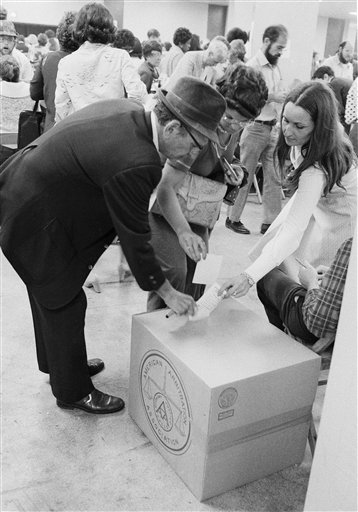The Supreme Court decision in Perry Education Association v. Perry Local Educators’ Association, 460 U.S. 37 (1983), elaborated on the Court’s use of the public forum doctrine to decide cases involving regulation of the time, place, and manner of communication. The Court had developed the more formal set of regulations to define the First Amendment right to free speech protections granted to speakers on government-owned property.
Teachers’ union obtained exclusive rights to interschool mail system
Two competing teachers’ unions, Perry Local Educators’ Association (PLEA) and Perry Education Association (PEA), represented teachers in the Metropolitan School District of Perry Township, Indiana, until 1977, when PEA won a representation election and negotiated a labor contract that included the exclusive right to use the interschool mail delivery system. PLEA sued for equal access to the mail system.
Court ruled agreement did not violate the First Amendment
The federal district court ruled in favor of PEA; however, the federal appeals court reversed. The Supreme Court ruled 5-4 that the preferential agreement between the PEA and the school district did not violate the First Amendment because the mail system did not constitute a public forum and the Township did not engage in viewpoint discrimination.
Court elaborated on the three types of forums
Justice Byron R. White, writing for the majority, identified three types of forums: quintessential (or traditional), limited, and nonpublic. The designation of a place as a traditional, limited, or nonpublic forum is important because the government has greater ability to control speech in a non-public forum than a limited public forum or a traditional public forum. Quintessential public forums include streets and parks, places traditionally open “to assembly and debate.” Government-created public forums are not automatically open to the public; however, once the government opens these to public use, it must provide equal access and limit restrictions to those “narrowly drawn to effectuate a compelling state interest.” In nonpublic forums the government may “reserve the forum for its intended purposes” with reasonable regulations on speech that do not discriminate based on viewpoint.
Majority found school mail facilities constituted a nonpublic forum
The Perry majority found that the school mail facilities constituted a nonpublic forum in part because the school administration controlled access. Because differential access was “based upon the status of the respective unions,” there was no viewpoint discrimination.
Since Schneider v. New Jersey (1939), the Court has ensured the right of the people to communicate in public forums. In Cox v. New Hampshire (1941), the Court recognized a governmental need to regulate communications in public places with regard to the time, place, and manner of their use and for public convenience. Finally, in Grayned v. City of Rockford (1972), the Court identified a principle of compatible use to decide time, place, and manner conflicts: “The crucial question is whether the manner of expression is basically incompatible with the normal activity of a particular place at a particular time.” These cases invited distinctions among the types of forums regulated by governments.
This article was originally published in 2009. Richard A. “Tony” Parker is an Emeritus Professor of Speech Communication at Northern Arizona University. He is the editor of Speech on Trial: Communication Perspectives On Landmark Supreme Court Decisions which received the Franklyn S. Haiman Award for Distinguished Scholarship in Freedom of Expression from the National Communication Association in 1994.

